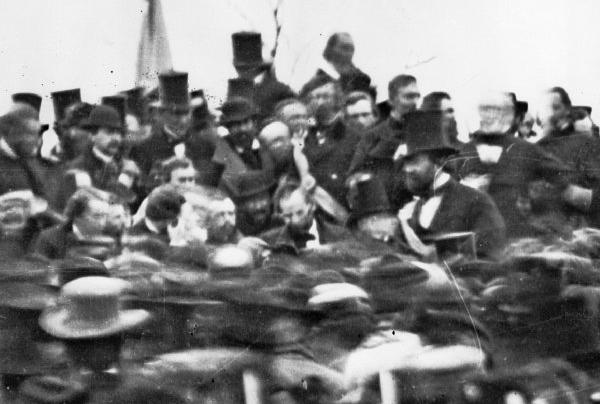I have been in Gettysburg, Pennsylvania for the last few days along with many other reenactors and living historians for the annual commemoration of remembrance day. On this day, November 19, 1863, President Abraham Lincoln gave a speech at the dedication ceremony for a new national soldiers cemetery here near the site of the bloodiest battle of the United States Civil War. It is always sobering, coming to Gettysburg, standing on the battlefield, and remembering what took place here and the number of men that gave their lives. Standing at the “high water mark” and looking out across the field of “Pickett’s Charge” even I cannot help but reflect on the bravery on the soldiers, both Union and Confederate during those three days of battle.
But those reflections are for another day, today we focus on remembering the dead and the speech that President Lincoln gave on that day. The speech lasted about 2 minutes and is one of the finest Presidential speeches of history. Lincoln reminded those present, and those that would read it later, of the principle of human equality as put forth by the founders of this nation in the Declaration of Independence. He proclaimed that the Civil War was a struggle not only to preserve the Union but that it would bring equality to all of its citizens. The gave homage to those who lost their lives i the struggle and that their sacrifice should not be forgotten.
President Lincoln’s Address at Gettysburg:
Four score and seven years ago our fathers brought forth on this continent, a new nation, conceived in Liberty, and dedicated to the proposition that all men are created equal.
Now we are engaged in a great civil war, testing whether that nation, or any nation so conceived and so dedicated, can long endure. We are met on a great battle-field of that war. We have come to dedicate a portion of that field, as a final resting place for those who here gave their lives that that nation might live. It is altogether fitting and proper that we should do this.
But, in a larger sense, we can not dedicate—we can not consecrate—we can not hallow—this ground. The brave men, living and dead, who struggled here, have consecrated it, far above our poor power to add or detract. The world will little note, nor long remember what we say here, but it can never forget what they did here. It is for us the living, rather, to be dedicated here to the unfinished work which they who fought here have thus far so nobly advanced. It is rather for us to be here dedicated to the great task remaining before us—that from these honored dead we take increased devotion to that cause for which they gave the last full measure of devotion—that we here highly resolve that these dead shall not have died in vain—that this nation, under God, shall have a new birth of freedom—and that government of the people, by the people, for the people, shall not perish from the earth.

